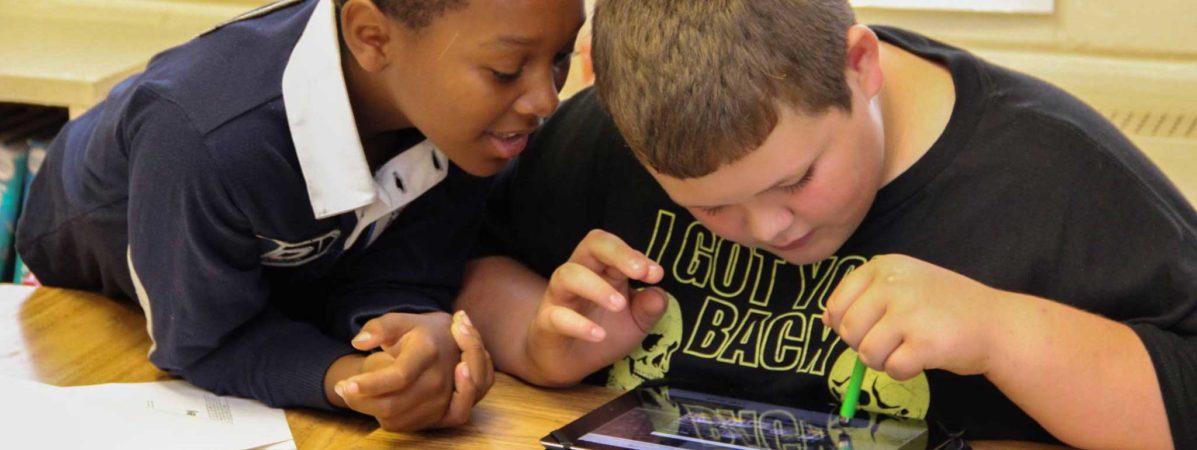
The Future Ready movement – an initiative spearheaded by the U.S. Department of Education and the Alliance for Excellent Education – is taking its show on the road, with regional summits happening now through June.
These regional summits are designed to help school district leaders design and implement digital learning and teaching strategies to set students up to succeed in today’s increasingly tech-enabled world.
Part of that preparation is learning from the successes, and missteps, of districts that have already started down the digital learning path.
Earlier this month, Lynn Moody, superintendent at Rowan-Salisbury Schools, joined Scott Smith, chief technology officer at Mooresville Graded School District, and Anthony Jackson, superintendent at Nash-Rocky Mount Public Schools, on a panel at the Raleigh summit to share four lessons they’ve learned on their path to become future ready.
1. Set priorities. “When we decided to go down this path, everyone said ‘We don’t have the money,’” Jackson said. But, he added, Nash-Rocky Mount managed to deployed 8,500 devices, all without adding a penny to the district’s budget.
How? By realigning resources and making room in their existing budget.
The district got rid of textbooks, for example, and funneled that money to supporting their digital conversion.
“I’ve yet to see a cutting-edge textbook,” Jackson joked.
Mooresville also funded its digital learning initiative without increasing funding.
Budgets are about priorities, according to Smith and Nash-Rocky Mount’s Jackson, who admitted that his district had to get rid of some “sacred cows.”
“The only thing that’s sacred is providing our students with the best educational experiences that we can provide,” Jackson said.
2. Support your teachers. The role teachers play in the classroom changed dramatically when Mooresville began incorporating technology into its schools.
“They are now facilitators of instruction,” said Smith. “They are roaming conductors.”
Smith admits it can be hard for teachers to make the adjustment, but even veteran teachers at Mooresville have found new ways to approach subjects they’ve been teaching for decades.
That didn’t happen overnight, though. Teachers received a lot of training to prepare them to use technology in the classroom. And, initially, that training was a bit off target, Smith said.
“One of the failures we made is we did not do the correct professional development for teachers,” he said, adding that the district started training teachers on the device. “That’s not the right focus.”
Mooresville eventually shifted the focus of their professional development to help educators adapt their teaching to a digital environment.
Professional development isn’t a one-and-done endeavor at Mooresville, either. Each month, the school has an early release day, where students are dismissed and teachers dive into ongoing training on how to better incorporate digital learning techniques and strategies into their classrooms.
3. Don’t ignore infrastructure. Districts need to pay as much attention to their network and digital infrastructure as they do to the the devices they’re placing in students’ hands.
“If your infrastructure is not sound and it’s not supported, it’s not going to work in the classroom,” said Jackson, who learned that lesson the hard way.
Nash-Rocky Mount experienced a “major infrastructure failure,” he said, in large part because they didn’t account for the full number of devices hitting their wireless network.
“If you really want to talk about a crisis, tell teachers this is what you want them to do, and then turn off the switch,” he said.
4. It’s OK to fail. Innovation is hard, messy work, said Moody.
Missteps are all but guaranteed, and the best thing district leaders can do is turn them into a learning opportunity.
“I promise you we will make mistakes,” she said. “We will learn and grow through them.”
That growth is key, said Jackson.
“I want you to fail,” he said. “I want you to fail forward, so tomorrow we do it better.”
What lessons have you learned during the course of your district’s digital transformation? Tell us in the comments below, then visit futurereadyschools.org to find a summit in your area.